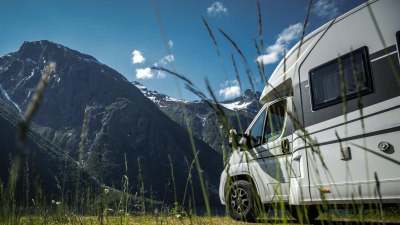How to Choose the Best RV for Long-Term Travel or Full-Time Living
Discover tips and insights on selecting the perfect RV for long-term travel and full-time living.

Choosing the ideal RV for long-term travel or full-time living requires thorough research and consideration of several factors. With the increasing popularity of the RV lifestyle, more people are hitting the open road, seeking freedom and adventure. However, the RV market offers a wide variety of vehicles, each catering to different needs and preferences. In this article, we'll explore the key factors to take into account when selecting the best RV for your long-term journey.
1. Determine Your Budget
The first step in choosing an RV is determining your budget. Consider not just the initial purchase price, but also ongoing costs such as maintenance, insurance, fuel, and campground fees. An affordable RV that fits within your financial limits will allow you to enjoy your travels without the stress of financial strain. Often, it’s worth investing a bit more upfront in a quality RV that will last longer and require less maintenance.
2. Decide on the Type of RV
There are several types of RVs to consider, including motorhomes, travel trailers, fifth-wheels, and camper vans. Motorhomes can be divided into Class A, B, and C, which vary in size and amenities. Travel trailers and fifth-wheels are towed by a vehicle, while camper vans offer a more compact option for mobility. Assess your travel style, family size, and comfort preferences to determine which type is best suited for your needs.
3. Assess Your Space Needs
Consider how much living space you will require. If you’re traveling solo or as a couple, a smaller RV may be sufficient. However, families or those traveling with pets may need more space to accommodate everyone comfortably. Think about the number of sleeping areas, kitchen space, and bathrooms you'll need. Also, consider whether you’ll be spending most of your time in the RV or outside enjoying nature.
4. Evaluate Construction Quality
The construction quality of an RV is critical, especially for long-term travel. Look for units made with durable materials that can withstand different weather conditions. Check the manufacturer’s reputation for quality, as well as the warranty offered. Inspections for leaks, structural integrity, and build quality should be performed before making a purchase. The last thing you want is to deal with ongoing repairs on the road.
5. Prioritize a Functional Layout
The RV's layout plays a vital role in your overall comfort. Pay attention to the flow of the space, ensuring that it allows for easy movement between different areas, especially when preparing meals or relaxing. Look for arrangements that maximize storage and consider the placement of essential features like the kitchen, bathroom, and sleeping areas. An efficient layout can make a significant difference in daily living.
6. Check for Amenities
Amenities can greatly enhance your comfort while living in an RV full-time. Features such as air conditioning, heating, a well-equipped kitchen, and comfortable seating are essential. Some RVs may also offer entertainment systems, outdoor kitchens, and additional storage options. Make a list of must-have amenities that suit your lifestyle, and weigh the importance of those against your budget.
7. Test Drive the RV
Once you have narrowed your options, it’s essential to test drive the RV. This will give you a feel for how the RV handles on the road, its size, and maneuverability. Pay attention to how comfortable you feel driving it, especially if you’re considering a larger vehicle. Don’t hesitate to take your time during this step; it’s important to be confident in your decision.
8. Research Fuel Efficiency
Fuel efficiency is a significant consideration for those who plan to travel long distances. Class A motorhomes tend to have lower fuel efficiency compared to smaller camper vans or Class C motorhomes. Always consider the miles per gallon (MPG) of the RV you are considering and factor in fuel costs as part of your overall budget. Investing in a more fuel-efficient model can save you money over time.
9. Consider Storage Options
Storage is a crucial aspect of living in an RV, as space is often limited. Look for RVs that offer multiple storage solutions, both inside and outside. Ensure there’s enough room for your personal belongings, cooking supplies, outdoor gear, and any equipment you may need for your travels. External storage compartments can also be a great asset.
10. Look into Off-Grid Capabilities
If you desire to travel to remote locations or boondock frequently, off-grid capabilities are essential. Look for RVs equipped with solar panels, batteries, and sufficient water storage. Features such as composting toilets and large holding tanks can enhance your ability to live independently off the grid. This preparation will expand your travel options and allow for more adventurous itineraries.
11. Research the Community
Joining an RV community can be incredibly beneficial for full-time travelers. Many communities provide support, resources, and friendships that can enhance your journey. Research local and online forums where RV enthusiasts share tips and advice on RV models, maintenance, and travel routes. Building connections with fellow travelers can lead to shared experiences and knowledge that will enrich your life on the road.
12. Plan for Weather Conditions
Consider the climate and weather conditions in which you intend to travel. Some RVs are better equipped to handle extreme temperatures than others. Insulation quality, heating systems, and air conditioning should be evaluated based on the climates you plan to spend time in. If you anticipate traveling through snowy or very hot regions, ensure that your RV has the necessary features to provide comfort in varying weather conditions.
13. Don’t Neglect Maintenance Costs
Maintenance is an essential part of RV ownership, especially for long-term travel. Familiarize yourself with the potential maintenance costs associated with the RV you’re considering. Some models may require more upkeep than others, so factor this into your budget when making your decision. Regular maintenance will ensure your RV runs smoothly and safely throughout your travels.
14. Think About Longevity
Investing in an RV is a long-term commitment, and the longevity of the vehicle should be a key consideration. Research how long different models typically last and read reviews from other RV owners. Choosing a reliable model with a strong track record can save you from frequent repairs and replacement costs, allowing you to focus on your adventures rather than mechanical issues.
15. Familiarize Yourself with Towing Capacity
If you’re considering a travel trailer or fifth-wheel, it’s crucial to understand your tow vehicle’s capacity. Ensure that your vehicle can tow the weight of the RV you are considering. Familiarize yourself with towing regulations and safety practices to ensure a seamless travel experience. Appropriating tow capacity will help you avoid potential accidents and provide a safe journey.
16. Select the Right Insurance
Insurance is often overlooked but is vital when it comes to RV ownership. Ensure that you have adequate coverage for your RV, which may include liability, collision, comprehensive, and personal property coverage. Research different insurance companies to find the best rates and coverage options for your needs. This preparation will help you avoid financial loss in case of accidents or damages.
17. Test the Systems
When purchasing an RV, it's crucial to test all the systems, including electrical, plumbing, appliances, and heating/cooling. Understanding how everything works before making a purchase will prevent potential headaches in the future. When inspecting the RV, take the time to ensure everything is functioning properly; this includes checking for leaks in the plumbing and making sure the AC and heater are operational.
18. Explore Different Brands
There are numerous RV manufacturers, each producing different models with varying features and quality. Research well-reviewed brands and those known for durability and customer service. Online reviews and forums can be a valuable resource in understanding the strengths and weaknesses of each brand before making a final decision.
19. Understand Financing Options
If you’re not buying the RV outright, it’s essential to understand your financing options. Know the interest rates, payment plans, and terms available to you. Many dealerships have financing departments that can help you understand your options. Create a budget that aligns with your financial situation to ensure your long-term travel remains enjoyable.
20. Embrace the Journey
Finally, choosing the best RV for long-term travel is not just about the vehicle; it’s about embracing the journey itself. Your RV will be your home on wheels, and every destination will offer new opportunities and experiences. Enjoy the process of selecting the right RV, and remember that your journey is an adventure waiting to unfold. As you explore new places, meet new people, and create lasting memories, the right RV will facilitate your dream of adventure and exploration.











